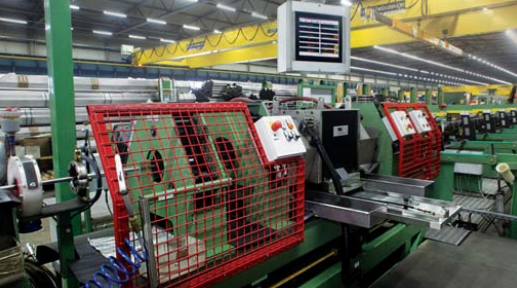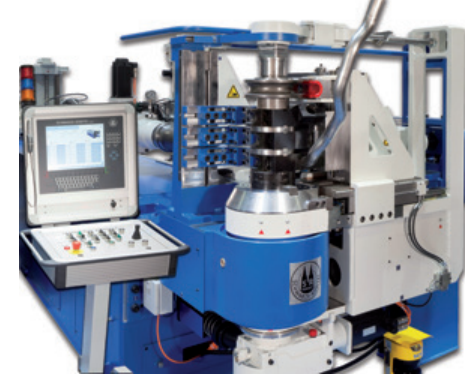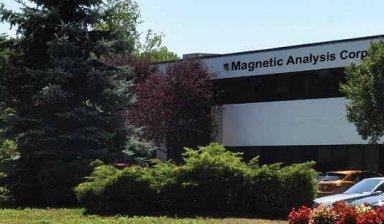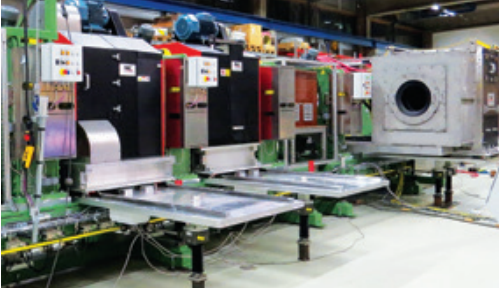STAINLESS STEEL WORLD MARCH 2016
Since being founded in Long Island City, New York, in 1928, Magnetic Analysis Corporation (MAC) has grown to become a worldwide leader in the nondestructive testing industry. The company developed the very first American-made nondestructive testing system using electromagnetic principles for the detection of flaws in an assortment of steel products. Since then, MAC has been a major global source of nondestructive testing (NDT) services and eddy current, electromagnetic, flux leakage, and ultrasonic inspection systems for testing metals.
In addition to its headquarters in Elmsford, New York, MAC also has facilities in Ohio and Sweden along with subsidiaries, field engineers, and experienced representatives all around the world ready and willing to provide customers with NDT product solutions.
Stainless Steel World recently had the pleasure of speaking with Mr. Dudley Boden, MAC’s President, about the benefits of being a global company, MAC’s dependable product solutions, and the company’s goals for the future.
A Global Reach
Boden continued to explain that being a global company really plays an important role in supporting customers. By maintaining a strong global presence, whether by a specific subsidiary location or by having a highly skilled representative servicing a particular area, MAC is able to assist customers when and where they need it most, no matter their current location. He clarified that in areas where there isn’t an actual subsidiary location or affiliated staff, MAC does have a reliable network of independent representatives. These representatives are unique in the field in that they all employ engineers and salespeople who are fully capable of installation, service, and support, exactly as if they were MAC employees. Many have offices, and some even have workshop facilities.
Boden maintained there are many advantages to having staff and representatives worldwide. For instance, if one economy in a certain area is down, another could be doing extremely well, helping to balance out the business’s overall revenue. This is especially important considering that the current manufacturing industry has already experienced significant consolidation over the past 10 to 15 years and continues to do so more and more every day. Looking specifically at the steel industry, Boden predicts it will consolidate even further and at a much faster pace than ever before. For MAC, this means it is dealing with the same companies time and time again, only in different locations around the world.
“From the customer’s perspective, one of the many advantages is that with MAC they can get a specific product in the United States and then they can easily get that same product in another part of the world, such as Russia or wherever they have other plants. So that’s a huge benefit we are proud to offer our customers. In terms of global competitors, a lot of our competition in places like India and China are solely local businesses, and they sell their products at a very low price because of their location. But they don’t offer the quality of product we do. When a steel company is selling their product locally, often the requirements of testing are not specified. However, a lot of these companies want to sell into international markets, and to do that they need to have testing equipment that is recognized internationally. Their customers recognize that if they want to go global themselves, they need a global partner. MAC is that global partner.”
MAC Around the World
Subsidiaries
- North America: Magnetic Analysis Corporation (MAC) – Main headquarters
- UK & Ireland: Magnetic Analysis Ltd.
- Italy: Magnetic Analysis Italia, S.r.l.
- Sweden: Magnetic Analysis Nordic AB (MAN)
- China: MAC Shanghai Representative Office
- Australia: Magnetic Analysis Australia, Pty. Ltd.
Representative Locations
- South America: Argentina & Brazil, Chile
- Asia: India, Indonesia, Japan, Korea, Taiwan, Thailand, Vietnam
- Middle East: Bahrain, Kuwait, Oman, Qatar & UAE
- Europe: Spain
- Eastern Europe: Czech Republic, Romania, Russia, Turkey, Ukraine
A custom-designed helical spinning conveyor system ensures accuracy as tubes are fed into MAC’s new APC (Automatic Pitch Control) full-body ultrasonic tube tester.
“As a company, the concept at Magnetic Analysis Corporation is that we are more than just an equipment manufacturer. Really, to make NDT work, you need both equipment and people; combining these two things is our forte and our strength,” explained Mr. Boden. “We have a larger and more experienced worldwide field staff than any other NDT supplier. Our whole focus is to partner with the customer to figure out what their real needs are and what the right equipment is for their application. Then we work with them to configure the test system and make it work in a way that is suitable and beneficial for them. We aren’t just selling the customer a piece of equipment.”
International Demand
When asked if there are certain MAC products that are in more demand in different areas of the world, he answers that it all really depends on a variety of factors such as national economies, international policies, etc. He detailed that before the drastic drop in oil prices and strict international sanctions were enforced, Russia was a big location for oil country tubular goods (OCTG). Because of this activity, flux leakage and ultrasonic systems were always in demand there.
In other areas like China and India, ultrasonic and eddy current systems are always popular because pressure tubing, nuclear tubing for power plants, and bar applications for the automotive sector constantly need testing. In fact, for MAC, its ultrasonic systems are currently its most active product line worldwide, with the eddy current systems coming in at a close second.
Currently in the US, MAC is in the process of installing its very first Ultrasonic Spinning Tube Test. This technology is specifically meant for larger diameter products, like bar or tubing, when it is too difficult to test them with rotary testers. In fact, some customers just prefer the spin tube type systems due to the simpler design. With this spinning tube test system, the product itself spins past the transducers, which are in a fixed location. This is the opposite of most rotary ultrasonic systems, where the transducers spin around the product. It is an innovative new product that MAC is hoping to install in more plants around the world in the near future.
Another company milestone is taking place in Italy, where MAC is currently installing and putting into operation its first Ultrasonic Phased Array system in a customer’s plant. This is a huge achievement, not only because the product is brand new, but also because it is a very large undertaking where the system has to fit into an already existing product line in the client’s facility. So there are a lot of constraints, making this installation a challenge, but one that MAC is more than capable of completing successfully.
Dependable Product Solutions
MAC’s product portfolio can be divided into three broad categories: the ultrasonic systems, which, as already mentioned, are the most popular product offering; the eddy current systems, which are often used to detect surface defects; and flux leakage systems, which are used more for carbon steel applications. Boden clarified that under those three broad categories, there are literally hundreds of product variations.
Under the ultrasonic category, there are the traditional rotary systems, but now there are also the phased array and spinning tube test systems. Then there are the billet inspection systems and even simple but powerful electronics that can be retrofitted into old mechanical systems that still work but perhaps need the electronics updated.
On the eddy current side, MAC offers approximately a hundred different types of test coils that have been designed over the years for specific applications. Many have been developed as a direct solution to a client’s specific problem and are now available to all customers who may need it. MAC prides itself on being able to develop products as a result of a specific client’s request. Through this customers get the best product, such as exactly the right coil for their needs. Out of the hundreds of quality products MAC offers, Boden wanted to highlight a few in particular.
“We have a huge range of ultrasonic rotaries, starting with those that can test small tubing or bar up to 50mm in diameter and ranging up to others that can handle large diameters up to 500mm. Then we have dozens of versions in between those two extremes. No one else offers that wide range of ultrasonic rotaries anymore. Many have shifted mostly to phased array ultrasonics, but that isn't always the best technology. Sure, it’s exciting, but in practical terms, ultrasonic rotaries can test products at higher speeds and detect more types of defects than a typical phased array system. So, we’ve really focused on the rotaries.”
He continued, “That being said, we do offer a phased array testing system for some clients who want that technology. We are flexible, and that’s what our competitors lack. They have a set product offering, and you have to buy strictly from that. MAC, of course, would like to sell something we’ve already designed, but it’s not a requirement. If our existing products don’t fit, we’ll look at how to modify them to meet your specific needs.”
All of MAC’s products are made in one of their ISO 9001-certified facilities. Many of the specific products, especially the ultrasonic rotaries, require a large number of custom-made parts. MAC has a network of high-quality machine shops that precisely manufacture these parts. Once completed, MAC employees assemble the final products.
Boden explained that there is no traditional assembly line because most products are highly customized, with numerous options available for each model. Instead, MAC follows a ‘team-built’ concept where a group works together to build a particular tester for a specific client.
Supporting Customers
Along with customizable and reliable product offerings, MAC provides superior customer service, which is key to customer satisfaction. Boden explained that while not everyone worldwide knows MAC well, once the company acquires a new client, they typically retain them for a long time.
“In many cases, MAC has had the same customer for 30 to 40 years—longer than some companies have even been in business! Similarly, we’ve had some equipment on lease at a client’s facility for 30 years. Thanks to MAC’s field support system, we keep the product running because the customer likes it, and it works well for their needs.”
“MAC focuses on supporting our customers,” stated Boden. “That means providing them with the right equipment, the right support to keep that equipment running, and the right knowledge to help them maximize the product’s lifespan. Our real value is our willingness to work with clients to develop the right solution and our ability to do that anywhere in the world. That’s our value proposition—providing NDT capability through both equipment and support.”
Future Goals
Looking ahead to 2016 and beyond, MAC is focused on expansion. Boden explained that while it’s still in the early stages, the company is strengthening its presence in regions such as Southeast Asia and Russia. MAC already has a presence in these markets—especially in Russia—but aims to further solidify its standing. In Southeast Asia, the company is expanding its support staff to better serve customers.
“What’s key is that in places like the United States and Western Europe, the steel business isn’t growing significantly. It has remained surprisingly strong in recent years, and we still conduct a large amount of business in these areas, but the major growth is happening elsewhere. The biggest markets now are in China, India, Russia, and Southeast Asia. Because of that, we are focusing even more on these regions, despite having been active there for a long time. We want to offer customers in these areas even more support.”



